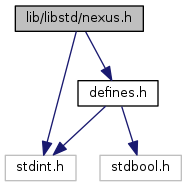|
EE445M RTOS
Taken at the University of Texas Spring 2015
|
|
EE445M RTOS
Taken at the University of Texas Spring 2015
|


Go to the source code of this file.
Macros | |
| #define | immutable |
| #define | public |
| #define | private |
| #define | always __attribute__((always_inline)) |
| #define | atomic_start() |
| #define | atomic_end() EndCritical(atom) |
| #define | atomic(x) |
| #define | postpone_death() while(1) |
| #define | Hz |
Typedefs | |
| typedef int32_t | memory_address_t |
| typedef int32_t | frequency_t |
Functions | |
| __attribute__ ((always_inline)) static inline int32_t StartCritical() | |
| void * | memset (void *, int, int) |
| void * | memcpy (void *, const void *, long) |
| int | strcmp (const char *, const char *) |
| int | ustrncmp (const char *, const char *, uint32_t) |
| void | ustrcpy (char *, const char *) |
| uint32_t | ustrlen (const char *s) |
| #define always __attribute__((always_inline)) |
| #define atomic | ( | x | ) |
| #define atomic_end | ( | ) | EndCritical(atom) |
| #define atomic_start | ( | ) |
Begin a critical section.
Definition at line 20 of file nexus.h.
Referenced by os_add_thread().
| #define Hz |
#Defined to nothing; results in code sugar allowing developers to easily determine which parameter is frequency.
Definition at line 45 of file nexus.h.
Referenced by button_debounce_start(), and main().
| #define immutable |
| #define postpone_death | ( | ) | while(1) |
A macro to make it clear what we're doing with this while loop.
Definition at line 40 of file nexus.h.
Referenced by _hw_get_channel(), adc_init(), hw_channel_init(), hw_driver_init(), hw_driver_singleton(), main(), os_tcb_of(), schedule(), and system_exec().
| typedef int32_t frequency_t |
| typedef int32_t memory_address_t |
| __attribute__ | ( | (always_inline) | ) |
Begin a critical section while saving the PRIMASK for future restoration.
End a critical section by restoring a previously saved PRIMASK.
| PRIMASK | to restore |
bug: this line should be removed in favor of the above to avoid blindly enable interrupts, but instead enabling interrupts only if they were previously enabled before the last function call.
| void* memcpy | ( | void * | , |
| const void * | , | ||
| long | |||
| ) |
A duplicate of the c standard memcpy function.
Definition at line 25 of file nexus.c.
Referenced by shell_set_ps1().

| void* memset | ( | void * | , |
| int | , | ||
| int | |||
| ) |
A duplicate of the c standard memset function.
Definition at line 4 of file nexus.c.
Referenced by shell_clear_shell_buffer(), and system_register_command().

| int strcmp | ( | const char * | , |
| const char * | |||
| ) |
A duplicate of the c standard strcmp function.
Definition at line 35 of file nexus.c.
References ustrncmp().
Referenced by _system_command_from_name().


| void ustrcpy | ( | char * | , |
| const char * | |||
| ) |
A duplicate of the c standard strcpy function.
Definition at line 69 of file nexus.c.
Referenced by system_register_command().

| uint32_t ustrlen | ( | const char * | s | ) |
A duplicate of the c standard strlen function.
Definition at line 17 of file nexus.c.
Referenced by shell_set_ps1(), and uart_send_string_().
